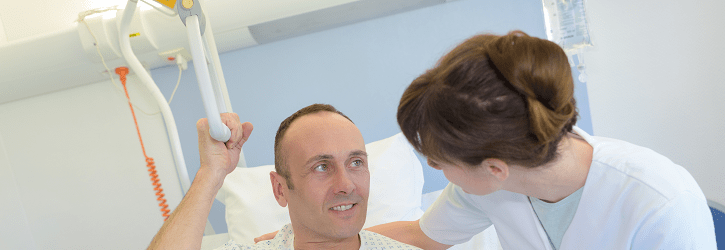
NHS breast screening problems: Legal Advice!
If you have had NHS breast screening problems, you may be entitled to make a claim for compensation if something has gone horribly wrong.
We’re involved in legal action over the 2018 breast cancer screening scandal where some half a million women didn’t receive their invitation for life-saving checks. The issue arose from a simple IT error that means the letters didn’t go out, and it’s suspected that hundreds of women may have died as a result.
Our lawyers can help you if you have been the victim of NHS breast screening problems like the 2018 scandal. Read more about what we may be able to do for you below.

Legal advice for hernia mesh complications
If you’re suffering with hernia mesh complications and you need legal advice about your options for help and assistance, we’re ready to listen.
We’re already acting for a group of patients suffering with hernia mesh complications. With the risk of problems being reportedly as high as 30%, and with over 170,000 suffering issues, it’s important for people to know what their options are.
For those who match our eligibility criteria, we can offer No Win, No Fee legal representation for compensations claims. Our advice is simple: don’t suffer in silence, and read this blog for some vital information.

Yet to start your transvaginal mesh claim? Read this now!
If you’ve yet to start your transvaginal mesh claim for compensation, we recommend that you read this urgent advice about your options for justice.
We know that people put off starting a legal case for many reasons. One of the main ones is the worry about having a formal legal claim. But if you leave it too late, you risk being unable to claim at all.
There can be a number of timeframes involved in a case like this, and we’ve had to turn people away in the past who have missed deadlines to claim. We don’t want you to miss out on your chance for justice. With that in mind, here’s a little useful guidance about making a transvaginal mesh claim for compensation.

Starting your vaginal mesh lawsuit with us
Starting your vaginal mesh lawsuit with the Group Action Lawyers, if you’ve yet to do so, can be quick and easy.
In the UK, there has been legal actions going on for quite some time. However, it’s taken a while for regulators and the NHS to really act on vaginal mesh complications that people are suffering from. Only last year did the NHS finally put a widespread pause on the use of mesh implants, pending further investigations. Although there are still few definitive answers we need in terms of the problems people are suffering from, we’re taking legal action for women who are suffering with problems.
We’re calling on anyone who has yet to initiate a vaginal mesh lawsuit in the UK to contact our team as soon as possible.

Start your Oculentis claim today
If you’ve yet to start your Oculentis claim, here’s some information about getting started today. It’s important to claim as soon as you can.
If you’re one of the hundreds of people who have suffered with opacification problems having been fitted with intraocular lenses manufactured by Oculentis, you may have a claim for compensation. The blind spots and cloudiness in the vision can be caused by calcification from phosphate that was previously used in the manufacturing process.
The way to correct the problem is to have further surgery for the lenses to be replaced. You may be able to claim personal injury compensation for having to undergo the further surgical procedure.

Compensation action for victims of the Oculentis recall
If you’ve been affected by the Oculentis recall, you may be eligible to join our compensation action with No Win, No Fee representation.
If you’re one of the hundreds of people who have been affected by the opacification problems related to surgically-implanted intraocular lenses, we may be able to help you. If you’ve been suffering with blind spots ore cloudiness in your vision, and needed / need corrective surgery, you could be entitled to thousands of pounds in compensation.
Even if you didn’t have to pay for the revision surgery, you could still be eligible to make a claim. But hurry: time limits for these types of cases can lead to people missing out on their chance to make a claim.

Oculentis compensation action
If you’ve yet to initiate your legal action for Oculentis compensation, make sure you speak to our team as soon as you possibly can.
In this type of action, there can be complicated (and multiple) time limits to claim. Missing one or more of these deadlines could mean the difference between receiving thousands of pounds in compensation or getting absolutely nothing at all.
You may be eligible to claim Oculentis compensation if you’re one of the hundreds of people affected by the recall of their intraocular lenses.

Breast cancer screening compensation
If you’ve yet to touch base with us about your No Win, No Fee options for breast cancer screening compensation, please get in touch as soon as you can.
We’re involved in legal action breast cancer screening compensation for the scandal that hit the media last year. This was the IT glitch that cut the age off of letter being sent to the vulnerable group (aged between 68 and 71). The result of the glitch meant some 450,000 women may not have receive their potentially life-saving invitation for breast cancer screening.
Shortly after the news of the scandal hit the press, we were contacted for help. We’ve agreed to act for women affected by the scandal on a No Win, No Fee basis.

Pelvic mesh compensation
You could be entitled to claim for pelvic mesh compensation with our team who are already representing women affected by this long-standing and serious issue.
A female lawyer from the team can be appointed for you, and we offer No Win, No Fee arrangements for people who claim with us. Although these can be incredibly complex cases to help people with, our expert team have a wealth of experience and relevant history to fight your battle for justice.
That’s why we’re prepared to offer our No Win, No Fee service for the cases, because we believe in access to justice for all.

Act now if you’re suffering from hernia mesh problems
The Group Action Lawyers are calling on people to act now when suffering with hernia mesh problems, and join others claiming with us.
We’re offering No Win, No Fee representation for victims who wish to claim for hernia mesh compensation. We’re already acting for a number of people suffering with problems, and it’s important to act now to secure compensation.
Medical group actions can often mean there are potentially complicated or unclear timeframes to claim. Now we’re in a new year, make sure that your hernia mesh compensation case is high up on your list of things to sort out!